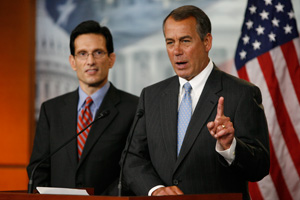House Republicans passed their health care reform repeal bill 245 to 189 Wednesday evening. Only three Blue Dog Democrats crossed over to join the GOP, while ten Dems who had voted against health reform last year refused to support repeal. Less noticed, though, were the Republicans from moderate districts who voted for repeal, a move that some liberal groups are hoping could make them more politically vulnerable.
The Public Campaign Action Fund, a left-leaning watchdog group, is already planning to run ads in the districts of three Republicans who voted for repeal on Wednesday, the National Journal reports via its morning politics newsletter:
PCAF’s initial ads target Reps. Jim Renacci, R-Ohio, Jon Runyan, R-N.J., and Tim Walberg, R-Mich. “New year, new Congress, same old Washington corruption,” the ads begin, going on to point out that each freshman took campaign contributions from health care and insurance interests so that “they can deny you coverage for preexisting conditions, kick your kids off your plan, and jack up premiums. Is this the change we voted for?”
Other Republicans could be singled out as well. The Washington Post flagged two freshmen House Republicans from moderate districts who could end up being hit on health care, Rep. Sean Duffy (R-Wis.) and Rep. Richard Hanna (R-NY). Neither pushed for full repeal of health reform during their campaigns, yet both fell in line and voted for the GOP’s repeal bill. “Unlike a lot of Republicans, [Duffy] has actually pointed to some of the good things contained in the law,” the Post writes, and he comes from a district that swung for Obama by 56 percent in 2008. Similarly, Hanna’s district also leans blue, and he’s similarly taken care to describe the parts of the law that he likes.
While neither freshman was expected to buck the party on repeal, their vote could end up making their re-election bids harder. Health reform is gradually growing more popular in the polls and could become a less toxic issue in the 2012 elections. If Democrats succeed in building the support for the legislation and the GOP overplays its hand, the Republican attempts to blast health reform could end up backfiring—at least in the districts that have traditionally swung for Democrats.













